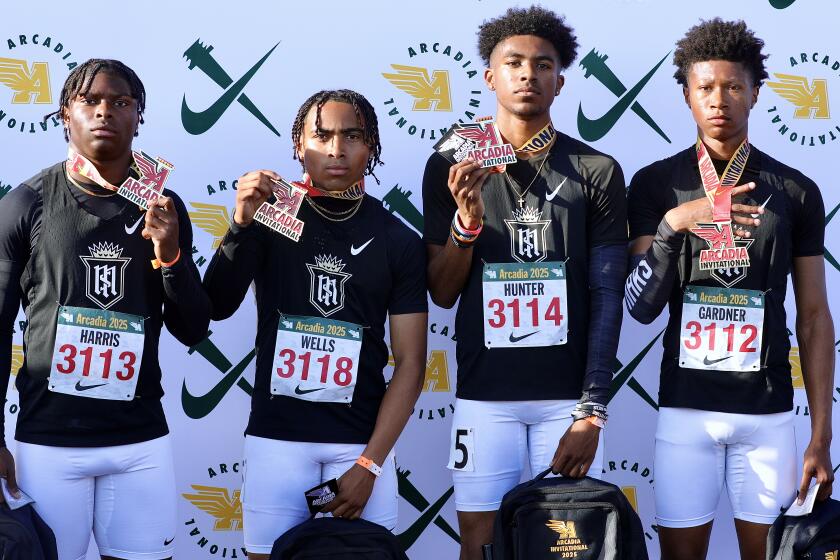Left Out, NFL Fans in L.A. Won’t Shell Out
- Share via
There’s a good reason why most Los Angeles pro football fans oppose the investment of public funds in a private NFL stadium:
They know they won’t be invited to the party.
Clearly, as of the booming 1990s, any new stadium in an area this populous would be designed for and reserved almost exclusively for two kinds of people:
* The very rich. In their luxury boxes, the few in that group would enjoy eight or 10 very big parties a year on NFL Sundays and Monday nights.
* Our poorer millionaires. The people in this somewhat larger group are those who can afford to buy expensive personal-seat licenses entitling them to buy expensive NFL tickets.
If any seats are set aside for what is called the middle class, they will be small in number and the worst seats in the house.
The problem for any prospective NFL owner in this city is not the size of the market. Topping 10 million, the Los Angeles market rivals New York’s. The problem for the NFL is that most of the 10 million in the Los Angeles area are hip enough in the first place to live in the Los Angeles area.
Comprehending what’s up, they realize they’ll never see a pro game in any new pro stadium around here, and so they’re against the use of public money for any stadium purpose--even road improvements.
Should, for example, the NFL and Rupert Murdoch get together, the Los Angeles millions--if asked--will vote against the use of their money to build him anything, roads or anything else.
*
Los Angeles, by comparison with, say, Cleveland or Baltimore, isn’t easy for an NFL visitor or any outsider to understand.
At first glance, to a would-be NFL owner, this has the look of a hot town. Full of NFL fans, Los Angeles appears, in fact, to be one of the best of all pro football towns though no longer served by a team of its own.
TV ratings bear out the perception. Almost every autumn week, the Los Angeles rating average exceeds or matches the national average for pro football.
On a typical NFL Sunday, from 10 a.m. to 4 p.m., the TV rating average is above 11 in Los Angeles, where 2s and 3s are good numbers for hockey, golf and most other sports. The rating here for the Washington Redskins at Dallas was 14 last fall the day after the Washington Huskies at UCLA hit 11.
Unless the Dodgers are in a pennant drive, the Lakers hold most-favored status in Los Angeles, where their TV numbers were 9.5 in January for Lakers at Seattle, 8.5 in February for Lakers at New York, and 7.3 in March for Detroit at Lakers.
By comparison, during routine Sunday scheduling last December, the Los Angeles numbers for three televised NFL games--two of which overlapped--were 15.8 for Minnesota at San Francisco, 12.2 for Denver at Pittsburgh, and 8.2 for Green Bay at Tampa Bay.
So the ratings are illuminating. But they’re also ambiguous. By no means do they tell the whole story. The numbers mean only that Los Angeles likes pro football. They don’t mean that Los Angeles wants an NFL team of its own.
To the contrary, most Los Angeles fans oppose pro football here because they know they’ll never see it--except on TV.
They’ve done the mathematics: Without investing in NFL cables, they’re already seeing three NFL games on network TV every Sunday. That’s better, they reason, than paying for a stadium, or stadium roads, and then losing one of those three games.
*
For other reasons, one proposal for NFL football here does have some merit.
A rebuilt Coliseum--on the site of two wonderful Olympic tournaments and three all-time World Series crowds among many other historic celebrations--might be worth some community funding.
For, in the Coliseum area, Los Angeles has a vested interest.
It is close to downtown. The new Science Center is nearby. A major university is nearby. The Shrine Auditorium--home of the Academy Awards again this year--is nearby. Neighborhoods needing our support and good will are nearby. Freeways are nearby.
And it’s as safe, police officers and Academy Awards people say, as Westwood or Hollywood.
To reach the Coliseum, moreover, no expensive new roads are necessary.
If NFL teams were playing there again, they would preserve, enhance, and extend the sense of togetherness and tradition that have made Los Angeles great.
More to Read
Go beyond the scoreboard
Get the latest on L.A.'s teams in the daily Sports Report newsletter.
You may occasionally receive promotional content from the Los Angeles Times.










